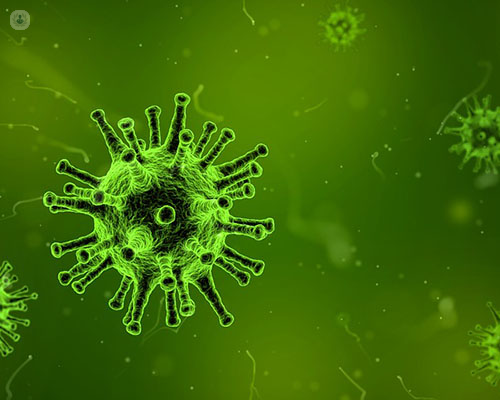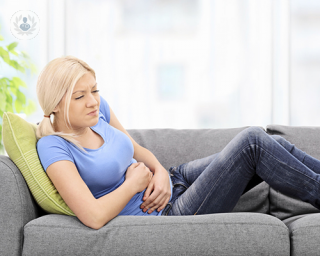Stomach flu
What is gastroenteritis?
Gastroenteritis, sometimes known as stomach flu, is an infection which causes inflammation of the intestines. This can lead to diarrhoea, dehydration, nausea, and vomiting.
Gastroenteritis is very common, especially in young children, though it can affect people of all ages. The cause of the infection is usually viral or bacterial.

What are the symptoms of gastroenteritis?
The main symptoms of gastroenteritis are diarrhoea and vomiting. If you do not ingest enough fluids to replace those lost due to the vomiting and diarrhoea, you may also begin to suffer from dehydration.
Other possible symptoms of gastroenteritis include:
- abdominal pain
- headache
- mild fever
- cramps in arms or legs
- nausea
- headache
These symptoms tend to last for just a few days, and vomiting should last no longer than one day. Signs you are dehydrated should also be monitored. These include having dry skin or a dry mouth, and feeling very thirsty.
How is gastroenteritis diagnosed?
Most people who experience gastroenteritis or have children with the condition will not need to see a doctor because symptoms usually settle after a few days.
However, if you are concerned about persistent or severe symptoms, and you visit the doctor, they are likely to ask you whether you have recently travelled abroad or been admitted to hospital. They may also inquire about your medical history, and ask if you have recently been in close contact with someone who has similar symptoms.
There are a number of common tests they may carry out to help determine the cause. For example, they may take your temperature, check your heart rate and blood pressure, and see if you are experiencing any abdominal pain.
In some instances, your GP may ask you to provide a stool sample. This is usually to determine what caused the gastroenteritis (i.e., bacteria, virus, parasite).
What causes gastroenteritis?
Gastroenteritis is usually caused by a viral infection. There are two main viruses which are responsible for the infection: rotavirus and norovirus.
Rotavirus is responsible for most cases of gastroenteritis in children. Children usually pick up this infection when they put their fingers in their mouths after coming into contact with a contaminated object. There is a vaccine available in the UK that protects babies against rotavirus. This is routinely given to infants as part of their childhood vaccination programme.
Norovirus is responsible for most cases of gastroenteritis diagnosed in adult patients, though it can also affect children. Most cases of gastroenteritis caused by norovirus are spread through the consumption of contaminated food or water. Norovirus is the most common cause of foodborne sickness worldwide.
Although it´s not as common, bacteria can also cause gastroenteritis. Common bacterial causes of gastroenteritis include salmonella, E. coli and campylobacter.

Is gastroenteritis contagious?
Yes, gastroenteritis is very contagious. Someone who is displaying symptoms of the illness should not come into close contact with anyone.
For this reason, your doctor may ask you not come to his office for a diagnosis, as you could be putting other patients at risk. Instead, a phone consultation may be offered.
Can gastroenteritis be prevented?
Gastroenteritis can be prevented through good hygiene habits such as:
- washing hands before eating, after going to the bathroom or after changing a baby's nappy
- regularly cleaning your bathroom toilet and sink
- washing all sheets and clothes of a recently infected person separately with hot water
If you visit someone in hospital it’s important to use the anti-bacterial hand gel or foam provided to reduce your risk of catching infection from other patients. Washing your hands with warm water and soap is even better.
Since gastroenteritis can spread through contaminated foods and drinks, all foods, especially meat and fish, must be thoroughly cooked. If you are travelling to countries with poor sanitation, it may be necessary to boil the water before drinking it.
If you have been sick with gastroenteritis, it is important to not go back to work or school until all symptoms have been gone for at least 48 hours.
Finally, to reduce the chance of your child developing gastroenteritis it’s important to make sure they are vaccinated against rotavirus, which is the most common cause of gastroenteritis in children in the UK .

What is the treatment for gastroenteritis?
The majority of people recover without specific treatment. However, there are some things you can do to manage the symptoms:
- eat milder-tasting foods to reduce your chances of further vomiting
- stay hydrated by taking small sips of water when you can.
- if you are severely dehydrated you can purchase rehydration tablets from your local pharmacy.
- take painkillers such as ibuprofen or paracetamol to relieve symptoms of fever and headache
How long does gastroenteritis last?
Gastroenteritis symptoms usually last for just a couple of days, although you may be contagious for longer. In some cases, symptoms could last for up to two weeks.
When should I see a doctor?
You should seek medical advice if you are unable to keep fluids down, if you notice blood in your diarrhoea or vomit, or if vomiting continues after more than a couple of days.
What should I eat while I have gastroenteritis?
When suffering from gastroenteritis, you should avoid very rich foods. It is best to eat rice, toast, pasta, lean meats, fruit and vegetables.
Fast food, very spicy food and sweets should be avoided. Make sure to drink plenty of water and avoid soft drinks or drinks with a high caffeine content.

Can gastroenteritis be fatal?
Gastroenteritis is very seldom fatal. If your symptoms do not subside after a couple of days, you notice blood in your vomit or stool or you are suffering from a high fever, you should seek medical assistance.
What specialist treats gastroenteritis?
A gastroenterologist is responsible for diagnosing and treating gastroenteritis and other problems related to the stomach and intestines.





